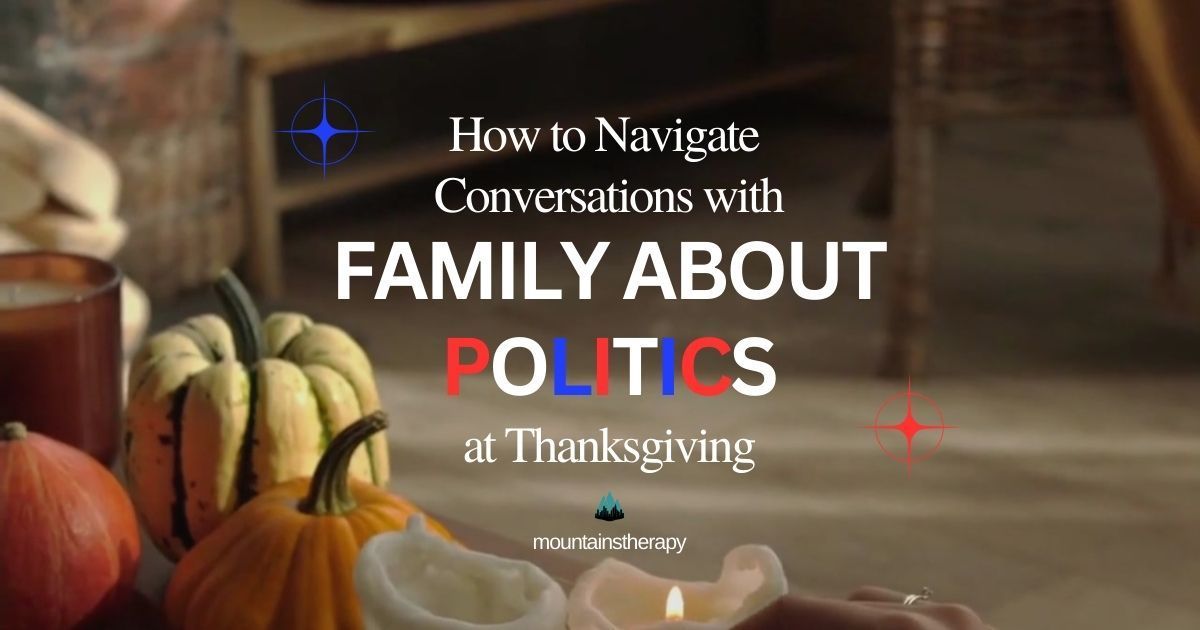How To Navigate Conversations about Politics with Family at Thanksgiving

Learn more about Family Therapy here.
Ah, Thanksgiving, a time for turkey, pie, and, let’s be honest, a little awkwardness when political discussions enter the mix. Especially, a few weeks after the 2024 U.S. presidential election results. While sharing a meal with loved ones can be heartwarming, differing political views can sometimes turn the table talk from festive to fiery. At Mountains Therapy, we understand how navigating these conversations can feel overwhelming. That’s why we’ve put together these strategies, inspired by principles from family therapy and counseling, to help you manage political differences with compassion and respect while maintaining your mental well-being.
1. Set Clear Boundaries Before the You Get Together
Preventing conflict starts with proactive communication, a cornerstone of family therapy. If you’re hosting Thanksgiving, consider setting expectations about the tone of the gathering:
- Example: “This year, I want our Thanksgiving to be about gratitude and connection, so let’s keep politics off the table to ensure everyone feels comfortable.”
- As a guest, it’s okay to decide your boundaries in advance. Share your feelings respectfully with loved ones if you anticipate sensitive topics coming up.
- If you’ve worked with a family counselor before, think about the tools you’ve practiced, like “I-statements” or boundary-setting techniques, and bring them into the conversation.
2. Respond, Don’t React
Political conversations can evoke strong emotions, but family therapists often encourage pausing before responding. Reacting impulsively can escalate tension, while responding thoughtfully helps maintain respect.
- Validate Feelings: “It sounds like this is something you’re really passionate about.” By staying grounded, you model emotional regulation—a skill often emphasized in therapy sessions for families and individuals.
- Redirect the Conversation: “This is a big topic! Maybe we can talk more about it later. For now, I’d love to hear about your holiday plans.”
3. Use Active Listening to Foster Understanding
Active listening, a key skill in both individual and family counseling, can be incredibly effective when navigating challenging conversations. It helps the speaker feel heard without necessarily agreeing with their perspective. When you listen openly, it can defuse defensiveness and make the conversation more productive.
Here’s how to practice active listening:
- Focus: Give the speaker your full attention, even if you disagree.
- Reflect: Repeat back or summarize what you heard to show understanding: “So, you’re saying you feel strongly about X because of Y?”
- Clarify: Ask neutral questions to explore their point of view without judgment.
4. Highlight Shared Values
In family therapy, we often encourage families to focus on common ground rather than differences. This same principle applies when discussing divisive topics. Political views may differ, but shared values like love, kindness, or a desire to make the world a better place can bridge divides. Shifting the focus to shared values reminds everyone that relationships are more important than being “right.”
- Example: “I think we can agree that we both care deeply about our community, even if we approach things differently.”
- Example: “No matter what, I’m grateful for the bond we have as family.”
5. Know When to Step Away
It’s okay to prioritize your mental health by excusing yourself from a heated discussion. Whether you’re practicing self-care or using techniques from counseling sessions, stepping away doesn’t mean you’re avoiding the issue—it means you’re protecting your emotional well-being. Taking a break can help you stay calm and re-engage in the conversation (or not) when you feel ready.
- Offer to help in the kitchen, play with the kids, or go for a quick walk.
- Use grounding techniques like deep breathing or mindfulness to reset.
6. Plan for Self-Care After Thanksgiving
Family therapy often emphasizes the importance of reflection after challenging interactions. Once the holiday is over, take time to process your experience and recharge. Self-care is a critical part of maintaining emotional resilience, especially when family dynamics are complex.
- Journal: Write about what went well and what was challenging.
- Practice Gratitude: Focus on the positive aspects of the gathering, even if there were tense moments.
- Talk to a Therapist or Counselor: A professional can help you explore emotions that came up and develop strategies for future interactions.
When Political Differences Challenge Family Relationships
It’s not uncommon for political differences to create ongoing tension in families. A family therapist or counselor can provide valuable tools for navigating these dynamics.
- Focus on Connection Over Convincing: Family therapy teaches us that relationships thrive on mutual respect, not agreement on every issue. You can disagree while still maintaining a strong bond.
- Understand the Root of Beliefs: Political opinions often stem from deeply personal experiences. Exploring these origins with curiosity, rather than judgment, can foster empathy.
- Let Go of the Need to “Fix” Others: Family counseling often emphasizes that you can only control your own actions and reactions—not those of others.
When to Seek Professional Support
If political disagreements are causing significant stress, anxiety, or feelings of isolation, consider reaching out to a therapist or counselor. Family therapy can be particularly helpful in creating a safe space to discuss sensitive topics and repair strained relationships.
At Mountains Therapy, we specialize in helping individuals and families navigate complex dynamics with compassion and understanding. Whether you’re dealing with holiday stress or seeking long-term support, our therapists are here to help you strengthen your relationships while maintaining your emotional well-being.
Reminders
- Thanksgiving is ultimately about gratitude, love, and connection.
- By setting boundaries, practicing active listening, and focusing on shared values, you can navigate political conversations with grace.
- It’s okay to prioritize your mental health—whether by taking a break during the holiday or seeking support through therapy.
From all of us at Mountains Therapy, we wish you a happy holiday season.













